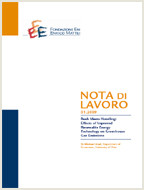Municipal Waste Selection and Disposal: Evidences from Lombardy

Data
23.02.2015
23.02.2015
Autori
Francesco Silvestri (University of Ferrara – Department of Economics and Management, eco&eco Ltd. Bologna); Stefano Ghinoi (Alma Mater Studiorum University of Bologna – Department of Statistics)
Codice JEL
C21, L97, Q53, R11
C21, L97, Q53, R11
Parole chiave:
Solid Waste, Waste Management, Fractional Logit Estimation, Regional Economics
Solid Waste, Waste Management, Fractional Logit Estimation, Regional Economics
Publisher
Climate Change and Sustainable Development
Climate Change and Sustainable Development
Editor
Carlo Carraro
Carlo Carraro
This article exploit a data base of 1.522 observations related to Lombardy’s municipalities to run a cross sectional estimation of the drivers of MW selection. We find no evidence of a significant correlation between the percentage of selected MW selection and market variables such as the unit charge for waste management, a result probably affected by the high degree of integration existing in Lombardy among collectors and disposal operators. On the contrary, we discover robust and significant correlation with a set of geographical, socio-economic, and political variables. Among the latter ones, we have a confirmations on the influence of party competition on the percentage of household recycling, with the left wing ruling parties more addressed to it than the rivals, and on the high correlation existing between MW selection and the implementation of a unit pricing scheme. Other positive correlations with the independent variable are shown by per-capita income, while quite surprisingly the education level of citizens seems to play no role.
***
Suggested citation: Silvestri, F., S. Ghinoi, (2015), ‘Municipal Waste Selection and Disposal: Evidences from Lombardy’, Nota di Lavoro 14.2015, Milan, Italy: Fondazione Eni Enrico Mattei.
